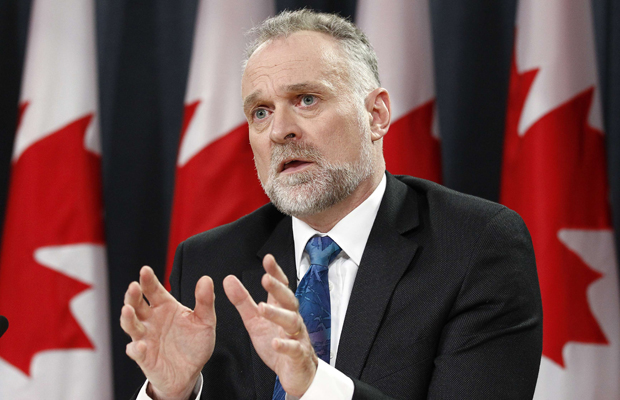“Devastating”, “Biting”, and “Not a Pretty Picture” – just some of the statements that followed the release of Auditor-General Michael Ferguson’s first report to Parliament. Yes it is official, April 3 2012 will go down as the toughest day yet for Canadian proponents of the F-35 Joint Strike Fighter (JSF) Program.
From its inception, the process surrounding the F-35 acquisition was unique. Akin to fitting a ballooning 385 billion dollar square peg into a 233 billion dollar round hole – and expecting it to fly. Driven more by the industrial benefits than the actual capabilities of the aircraft, it is clear that the F-35 procurement has proven incredibly difficult for our public servants, and governmental institutions, to manage.
To a large extent, the JSF program represents a textbook case of the complications inherent to industry/government relationships. Within this context, governments are expected to make decisions with information from industry and internal analysis. However, without internal capacity, or the appropriate level of expertise, governments become prone to relying too heavily on the private sector for critical information.
From the perspective of governance, it is imperative to incorporate set procedures, institutions, and lines of accountability within the acquisition process (affectionately referred to as red tape). This ensures consistency and the appropriate mitigation of risks associated with “industry capture.” Traditional defence procurement contains these inbuilt mechanisms; however, in the case of the F-35 it is becoming increasingly clear that such measures were not up to task. Indeed, from the beginning the F-35 acquisition represented wholly different procurement experience. The developmental nature of the program, exacerbated by primacy of industrial benefits, forced the F-35 acquisition in through the preverbal back door. Initial oversight was provided not by Public Works and Government Services Canada (PWGSC), as is customary, but by DND and Industry Canada.
It was DND and Industry Canada’s contention that waiting for a traditional open competition would have left Canadian industry out of the program’s inner circle, thereby cutting off potential industrial benefits provided by future F-35 sales.
In the context of F-35 industrial benefits, the Auditor-General’s assessment was clear, “efforts to secure industrial opportunities through the system development and demonstration phase were significant and the results were successful.” However, these positive results were overshadowed by the failure to meet due diligence standards required to bring the F-35 to Canada.
In this light, DND and Industry Canada failed to “inform decision makers of the [wider] implications of participation in the JSF Program.” Furthermore, PWGSC failed to assume its “role as the government’s procurement authority.”
Government’s Response
In response to the AG’s report, the government has taken several steps to reassert PWGSC’s oversight and increase transparency within the F-35 acquisition program.
First, Parliament has frozen all funding for the program. This response should work to alleviate fears that the program’s cost structure is out of control and unaccountable to Parliament.
Second, the government has established an F-35 Secretariat within the Department of Public Works and Government Services. This is more in-line with how defence procurement is traditionally conducted. The government has also demanded additional PWGSC oversight through a committee comprised of Deputy Ministers – some of whom were part of the program to distribute shipbuilding contracts in accordance with the National Shipbuilding Strategy. This new secretariat will be responsible for providing annual updates to Parliament.
Third, the Treasury Board Secretariat will be expected to conduct an independent review of DND’s acquisition and sustainment project assumptions, and potential costs for the F-35. These results will be made public prior to the decision to formally acquire the F-35.
Finally, Industry Canada will provide updates to Parliament, via the F-35 Secretariat, explaining the ongoing benefits for Canadian Industry provided by the F-35 global supply chain.
In Closing
Through the OAG report, Michael Ferguson has made it clear that the F-35 acquisition program is one without precedence in Canadian defence procurement history. Conventional procurement processes were simply unable to deal with the complexities of the JSF program. As such the door was left wide open for a more “elastic” and unaccountable regimen to assume responsibility for the program’s administration.
The OAG report has provided a breath of fresh air for those following the progress of the program, and although it is far from damning, it has provided an appropriate wake-up call for politicians and bureaucrats alike. The report and subsequent adjustments demanded by Parliament will deliver short term pain in the interest of transparency and accountability. Such fundamental changes are necessary to ensure the sustainability of the wider program.
If there is a silver lining to this report, it is evident in the strength of the institutions responsible for the checks and balances within our governance structure. If Canadians are to have confidence in the decision to equip their forces with the F-35, they must have confidence in the process that delivers it.
And that’s the beauty of the process – it’s fixable.
Further Reading: Replacing Canada’s Fighter Jets Report of the Auditor General of Canada to the House of Commons, Industry Canada Joint Strike Fighter, Parliamentary Budget Office Report, F-35 Joint Strike Fighter (JSF) Program: Background and Issues for Congress, America‘s Self-Destroying Airpower




